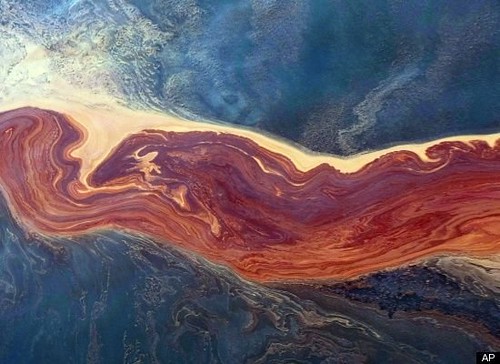Cause and Effect
/
A particular thought struck me last night as I pulled away from the Rochester police SUV: I really like to drive fast, and the past couple of years speeding along in my Mini have just hit the register, and it's time to pay up. I had been caught flat footed, something I somewhat predicted would happen at some point, and ten agonizing minutes later, I was issued a citation for speeding through the small village. The moral of the story? There are costs for everything, and my tendencies to drive a bit faster ends up with some additional risks and because of those risks, there's some consequences to that. Over the course of my driving history, the fine won't even out to be much, but it served as a humbling reminder that there are rules in place to govern my behavior, in the public interest.
Driving away, listening to the radio about more news on the oil spill in the Gulf of Mexico, I can't help but wonder if the same thing needs to be applied to companies such as British Petroleum. I've watched in a sort of numb horror as the situation has gone from bad to catastrophically bad, all the while hearing that the oil company is readying another attempt to stem the flow of oil. Up until now, they’ve been largely unsuccessful in capping the flow, and I can understand why this is such a time consuming problem.
The main issue is that the wellhead is under a mile of water – the pressures at that depth are immense, and the well itself actually runs another thousand or so feet below the bedrock to the reservoir. The pressure of the crust and ocean on top of it undoubtedly is pushing the oil out through the only weakness in the area: the wellhead, and hampering efforts to plug it up. It’s even somewhat understandable to realize why it’s taking such a long time: this sort of problem has never occurred before, and a lack of planning and experience is leaving BP with few answers.
BP and off-shore drilling advocates are at fault here for pushing a short-sighted agenda. As the United States economy grew, demand for oil increased, and alternative sources for cheap petroleum had to be sought out, while to help speed this along, incentives were granted to a number of companies to encourage them to look for more reserves. Increased pressure and instability from around the world, such as in the Middle East, has only further pushed this along as a reasonable alternative. The United States has looked to tackle the problem with the quickest method: there is a demand for oil, thus, more oil needs to be found, rather than looking at ways to reduce the need for demand for oil while accomplishing the same tasks and actions as before. During the 2008 presidential election, I was encouraged by President Obama’s reasonable approach to this, looking for alternatives that would allow for a far more sustainable course of action, one that would ultimately be cheaper and allow for less pollutants and risk to the environment.
BP is at fault for doing much the same thing: as more details emerge from the wreckage of the Deepwater Horizon, it seems that there was no contingencies or planning on the part of the oil company for a disaster, but also that the company had sought to cut corners with experimental technology, only to have it backfire with untested and untried equipment that is ultimately poisoning the Gulf Coast. Their desire for a quick buck, BP has surpassed their desire to protect their workforce and the environment in which they’re working. BP will most likely come out of this disaster with a tarnished reputation while the livelihoods of those that depend upon the Gulf of Mexico are ruined for generations to come.
What needs to happen is a consequence for the oil company, and any others, that will become a major deterrent to prevent this sort of behavior. Just as my speeding ticket will serve as a potent reminder of the consequences of risking public safety by directly impacting my available cash for the next month, so to must BP be punished for their mistakes, in a way that directly impacts the company to make them rethink policy and once again put the public’s best interests first. Just as driving fast works well for the individual, it puts others at risk who are uninvolved, who have no say in how their livelihood will be affected. The oil spill in the Gulf has ruined a natural resource, because of the shortsighted policies of BP and the U.S. Government.
On my drive home last night, I stuck to the speed limit, closely. Today, tomorrow, and for a while, I’ll be much more careful, as I am reminded of the impact that casually breaking speed laws has upon me. BP, and other companies that operate and impact the public need to be held to the same standard. It doesn’t matter that they create some jobs and revenue for the economy because of what they do – mistakes like the ongoing spill demonstrate that they will have a much bigger, far more costly impact in the future, which sets everyone back.
